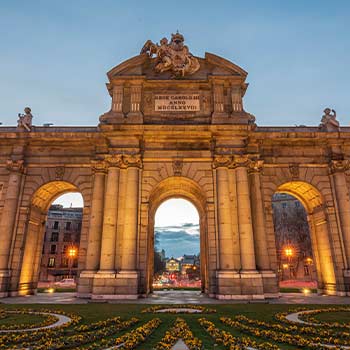Thermodynamics
Engineering Program
Rome, Italy
Dates: 5/12/25 - 7/3/25

Thermodynamics
OVERVIEW
CEA CAPA Partner Institution: CEA CAPA Rome Center
Location: Rome, Italy
Primary Subject Area: Engineering
Instruction in: English
Course Code: ENGR281FCO
Transcript Source: University of New Haven
Course Details: Level 200
Recommended Semester Credits: 3
Contact Hours: 45
Prerequisites: Prior to enrollment, this course requires you to have completed the following: Introductory Physics, Introductory Chemistry, Calculus III (derivation, integration, and elements of vector calculus).
DESCRIPTION
This course will guide you through thermodynamics, the branch of Engineering that deals with the macroscopic behavior of systems. Thermodynamics defines quantities such as internal energy, entropy, and pressure that describe the global properties of a body. It states that the behavior of these quantities is subject to general constraints that are valid for all materials whether these are liquids, solids, gasses, and irrespective of their particular properties and chemical composition. These general constraints are expressed in the Laws of Thermodynamics which can be interpreted in terms of statistical mechanics.
In the course, you will be dealing with heat and temperature and their relation to energy and work. You will master fundamental issues such as energy conservation, irreversibility, and how these govern the working of devices. As a tool for Engineering, thermodynamics will provide you with the methods to analyze and use physical laws in processes aimed at transforming, transferring, and storing energy such as in engines, refrigerators, and batteries.
The course includes basic elements of classical thermodynamics, the First and Second Laws, the properties of pure materials, the Ideal Gas Law, the Carnot Cycle, control volume analysis of closed simple systems and open systems at steady state; Engineering applications, including engine cycles and psychrometrics.
You will have the opportunity to discuss in physical and quantitative terms the functioning of systems that are apparently complex and diverse such as a heat pump, a combustion engine, or a solar panel. You will explore situations that bring the predictive power of physics into play in unexpected and important situations such as in the energetics of a living cell and discuss ideas such as harnessing energy from the surroundings that continuously challenge engineers and are at the heart of our present energetic and environmental concerns and strategies.
In the course, you will be dealing with heat and temperature and their relation to energy and work. You will master fundamental issues such as energy conservation, irreversibility, and how these govern the working of devices. As a tool for Engineering, thermodynamics will provide you with the methods to analyze and use physical laws in processes aimed at transforming, transferring, and storing energy such as in engines, refrigerators, and batteries.
The course includes basic elements of classical thermodynamics, the First and Second Laws, the properties of pure materials, the Ideal Gas Law, the Carnot Cycle, control volume analysis of closed simple systems and open systems at steady state; Engineering applications, including engine cycles and psychrometrics.
You will have the opportunity to discuss in physical and quantitative terms the functioning of systems that are apparently complex and diverse such as a heat pump, a combustion engine, or a solar panel. You will explore situations that bring the predictive power of physics into play in unexpected and important situations such as in the energetics of a living cell and discuss ideas such as harnessing energy from the surroundings that continuously challenge engineers and are at the heart of our present energetic and environmental concerns and strategies.







